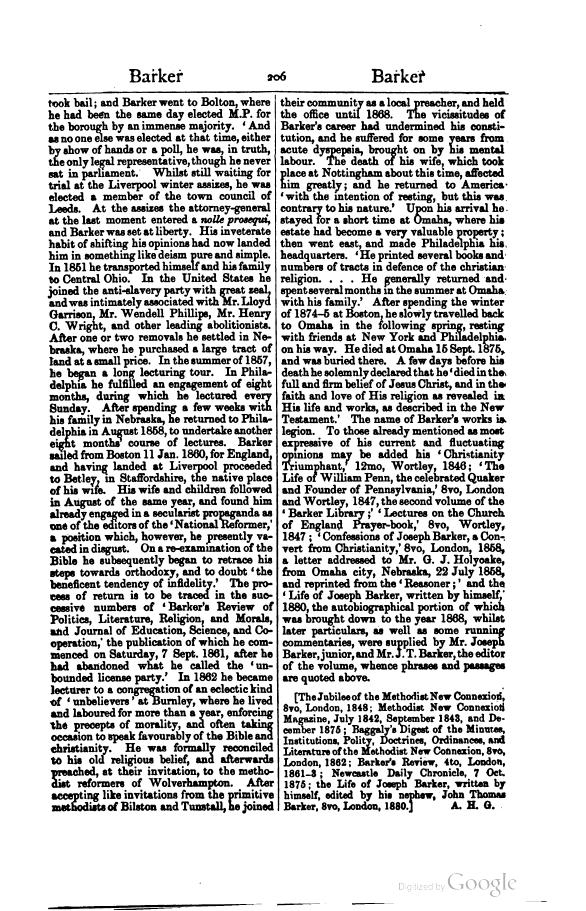took bail; and Barker went to Bolton, where he had been the same day elected M.P. for the borough by an immense majority. ‘And as no one else was elected at that time, either by show of hands or a poll, he was, in truth, the only legal representative, though he never sat in parliament.’ Whilst still waiting for trial at the Liverpool winter assizes, he was elected a member of the town council of Leeds. At the assizes the attorney-general at the last moment entered a nolle prosequi, and Barker was set at liberty. His inveterate habit of shifting his opinions had now landed him in something like deism pure and simple. In 1851 he transported himself and his family to Central Ohio. In the United States he joined the anti-slavery party with great zeal, and was intimately associated with Mr. Lloyd Garrison, Mr. Wendell Phillips, Mr. Henry C. Wright, and other leading abolitionists. After one or two removals he settled in Nebraska, where he purchased a large tract of land at a small price. In the summer of 1857, he began a long lecturing tour. In Philadelphia he fulfilled an engagement of eight months, during which he lectured every Sunday. After spending a few weeks with his family in Nebraska, he returned to Philadelphia in August 1858, to undertake another eight months' course of lectures. Barker sailed from Boston 11 Jan. 1860, for England, and having landed at Liverpool proceeded to Betley, in Staffordshire, the native place of his wife. His wife and children followed in August of the same year, and found him already engaged in a secularist propaganda as one of the editors of the ‘National Reformer,’ a position which, however, he presently vacated in disgust. On a re-examination of the Bible he subsequently began to retrace his steps towards orthodoxy, and to doubt ‘the beneficent tendency of infidelity.’ The process of return is to be traced in the successive numbers of ‘Barker's Review of Politics, Literature, Religion, and Morals, and Journal of Education, Science, and Co-operation,’ the publication of which he commenced on Saturday, 7 Sept. 1861, after he had abandoned what he called the ‘unbounded license party.’ In 1862 he became lecturer to a congregation of an eclectic kind of ‘unbelievers’ at Burnley, where he lived and laboured for more than a year, enforcing the precepts of morality, and often taking occasion to speak favourably of the Bible and christianity. He was formally reconciled to his old religious belief, and afterwards preached, at their invitation, to the methodist reformers of Wolverhampton. After accepting like invitations from the primitive methodists of Bilston and Tunstall, he joined their community as a local preacher, and held the office until 1868. The vicissitudes of Barker's career had undermined his constitution, and he suffered for some years from acute dyspepsia, brought on by his mental labour. The death of his wife, which took place at Nottingham about this time, affected him greatly; and he returned to America ‘with the intention of resting, but this was contrary to his nature.’ Upon his arrival he stayed for a short time at Omaha, where his estate had become a very valuable property; then went east, and made Philadelphia his headquarters. ‘He printed several books and numbers of tracts in defence of the christian religion. … He generally returned and spent several months in the summer at Omaha with his family.’ After spending the winter of 1874–5 at Boston, he slowly travelled back to Omaha in the following spring, resting with friends at New York and Philadelphia on his way. He died at Omaha 15 Sept. 1875, and was buried there. A few days before his death he solemnly declared that he ‘died in the full and firm belief of Jesus Christ, and in the faith and love of His religion as revealed in His life and works, as described in the New Testament.’ The name of Barker's works is legion. To those already mentioned as most expressive of his current and fluctuating opinions may be added his ‘Christianity Triumphant,’ 12mo, Wortley, 1846; ‘The Life of William Penn, the celebrated Quaker and Founder of Pennsylvania,’ 8vo, London and Wortley, 1847, the second volume of the ‘Barker Library;’ ‘Lectures on the Church of England Prayer-book,’ 8vo, Wortley, 1847; ‘Confessions of Joseph Barker, a Convert from Christianity,’ 8vo, London, 1858, a letter addressed to Mr. G. J. Holyoake, from Omaha city, Nebraska, 22 July 1858, and reprinted from the ‘Reasoner;’ and the ‘Life of Joseph Barker, written by himself,’ 1880, the autobiographical portion of which was brought down to the year 1868, whilst later particulars, as well as some running commentaries, were supplied by Mr. Joseph Barker, junior, and Mr. J. T. Barker, the editor of the volume, whence phrases and passages are quoted above.
[The Jubilee of the Methodist New Connexion, 8vo, London, 1848; Methodist New Connexion Magazine, July 1842, September 1843, and December 1875; Baggaly's Digest of the Minutes, Institutions, Polity, Doctrines, Ordinances, and Literature of the Methodist New Connexion, 8vo, London, 1862; Barker's Review, 4to, London, 1861–3; Newcastle Daily Chronicle, 7 Oct. 1875; the Life of Joseph Barker, written by himself, edited by his nephew, John Thomas Barker, 8vo, London, 1880.]
